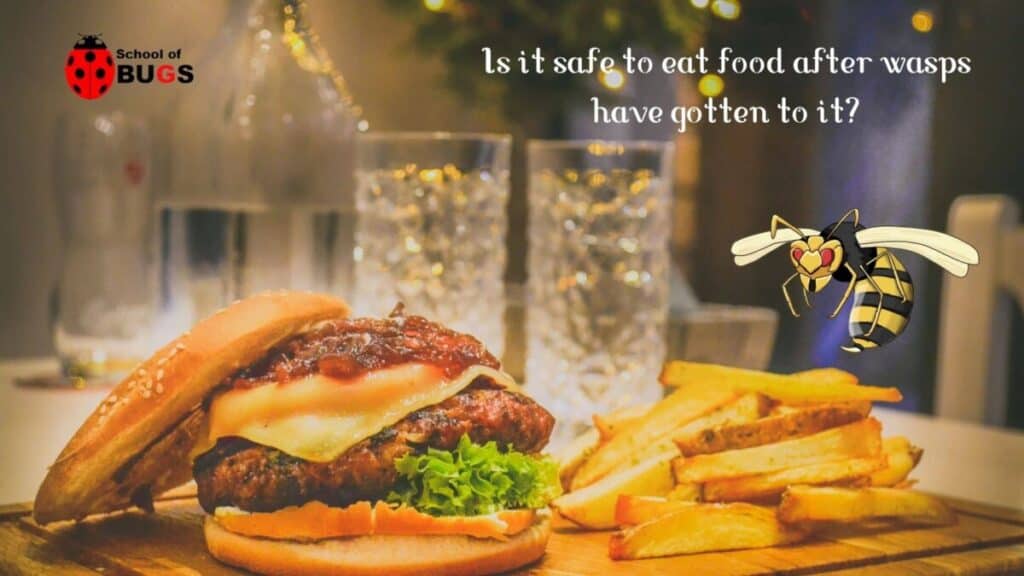
Introduction
If you have had wasps land in your food, you have probably wondered whether you can eat that food, or if bacteria and germs will have been transferred by the wasp.
We all know we can’t eat foods that flies have landed in, but does a wasp make food unsuitable?
On the whole, wasps are considered cleaner than flies, and you probably don’t need to worry too much about eating foods that a wasp has landed on.
However, wasps do sometimes feed on rotting fruit, so if you have a sensitive stomach, consider avoiding foods that have been eaten by wasps.
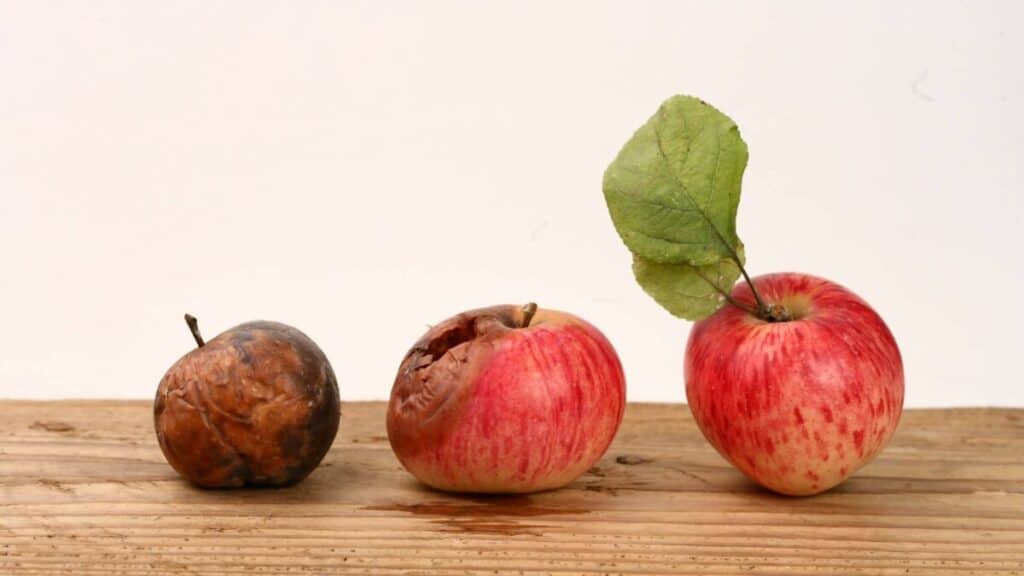
In this article, we will look at:
- Whether you can eat food that a wasp has landed on
- What the potential risks are
- What you should do if a wasp has landed on your food
- How to deter wasps from landing on your food
- Whether wasps eat human food and what they generally consume
- Why multiple wasps may appear
Can You Eat Food That A Wasp Has Landed On?
In general, it should be safe to eat food that a wasp has landed on. Wasps are predators that feed on a wide variety of foods, but unlike flies, they do not eat animal waste.
That means they are unlikely to be carrying dangerous germs. However, in theory, a wasp may have crawled across:
- Rotten meat
- Rotten fruit
- A dead animal
- Other insects
- Dirt
Throughout a lot of the year, wasps prey on insects and collect things like food waste. If you leave food outside, you are quite likely to see a wasp on it from time to time.
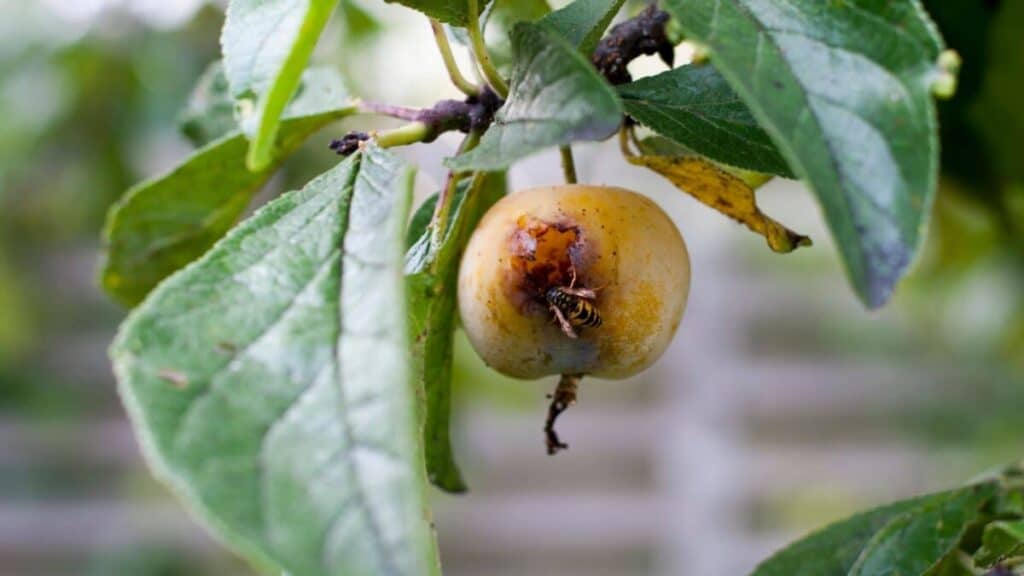
You don’t need to worry too much about eating food that a wasp has landed on, but it is admittedly unpleasant.
You might feel uneasy about eating the food, especially if there is a possibility that the wasp has been feeding on carrion.
If that’s the case, you can either throw the food away, or scoop off the top layer and remove it. This should get rid of any contaminants that may have been introduced to the food.
It will work for most kinds of food and lets you save the meal without feeling squeamish about it.
What Happens If You Eat Food That Wasps Have Gotten Into?
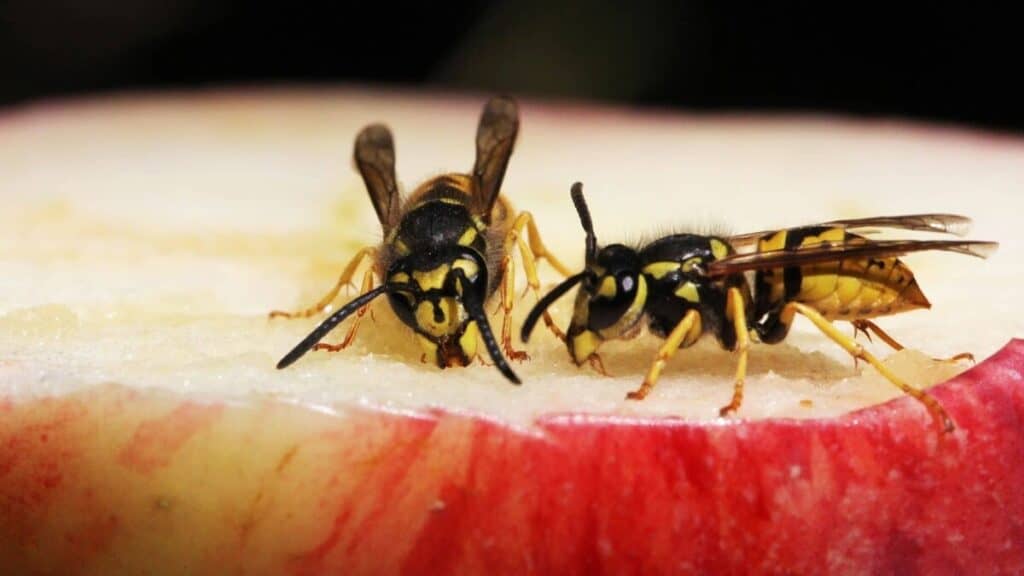
It is unlikely that anything bad will happen to you if you eat food that wasps have gotten into. Even if the wasp has spread some contamination, it is likely to be in such small quantities that your natural defenses will overcome the bacteria and you won’t even notice it.
In very rare cases, you could get sick. If the wasp has got mold spores on its feet or has collected bacteria from rotten meat, there is a possibility that it will spread this contamination to the food it lands on.
If you are unlucky, this could make you sick when you eat the food, because the mold or bacteria will enter your system.
However, there is not a high chance of this happening. Even if the wasp has contracted something unpleasant, it is not likely that this will make you sick, because the quantities will be so small.
On the whole, wasps don’t land in places that spread diseases, and they are highly unlikely to transmit anything dangerous to your food.
You can therefore usually eat food that wasps have gotten into without any problems.
What Should You Do If A Wasp Lands in Your Food?
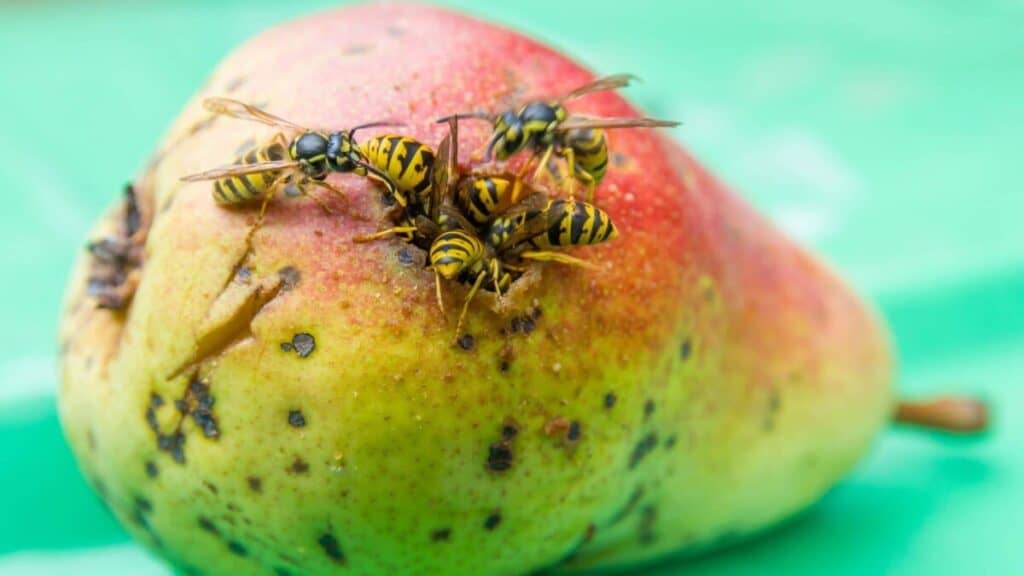
If wasp lands in your food, don’t panic and start flapping at it. This will agitate it and may get you stung. Instead, wait for the wasp to move off the food, and then cover the food up so it cannot get any more. You can eat the food without worrying about it once the wasp has gone.
If you don’t want to eat the bit of the food that the wasp has touched, you can simply pull or scoop that piece of the rest of the food and discard it.
When that has been done, the rest of the food should be fine for you to consume.
However, if you feel uncertain about this, you may wish to discard the food instead of consuming it.
How Do You Prevent Wasps From Getting Into Your Food?
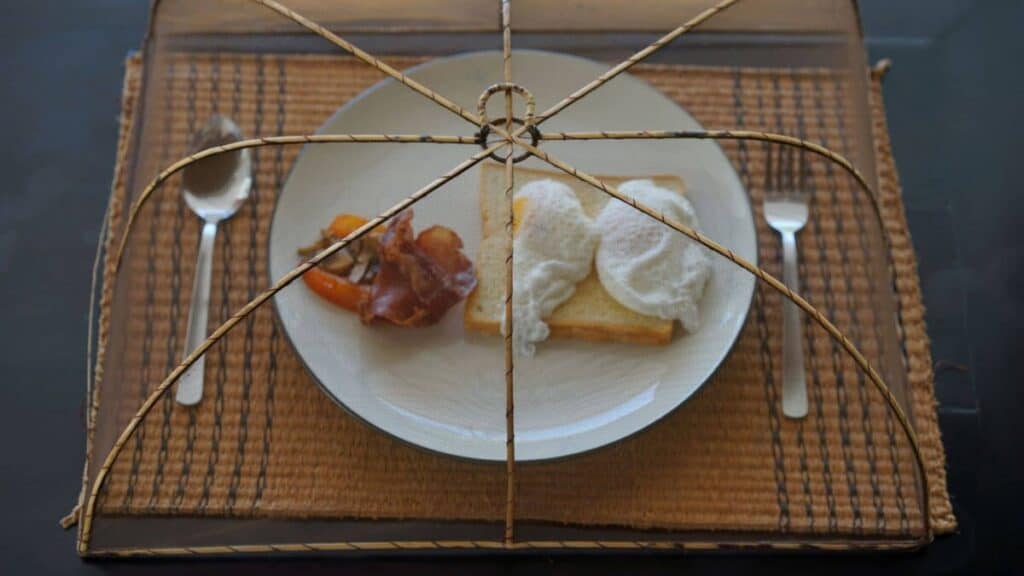
The best thing to do if you are concerned about wasps getting into your food is to make sure you cover it up, especially during the season when wasps are looking for food.
This tends to be in the fall, and wasps are usually looking for sweet foodstuff at this time.
That means that sodas, ice cream, candy, chocolate, fruit, and other sweet food need to be kept in the house and preferably under covers at all times.
If you are drinking soda outside, consider putting a lid over the glass to prevent wasps from smelling it. Similarly, if you are eating a bowl of ice cream, cover it whenever you are not actively consuming it.
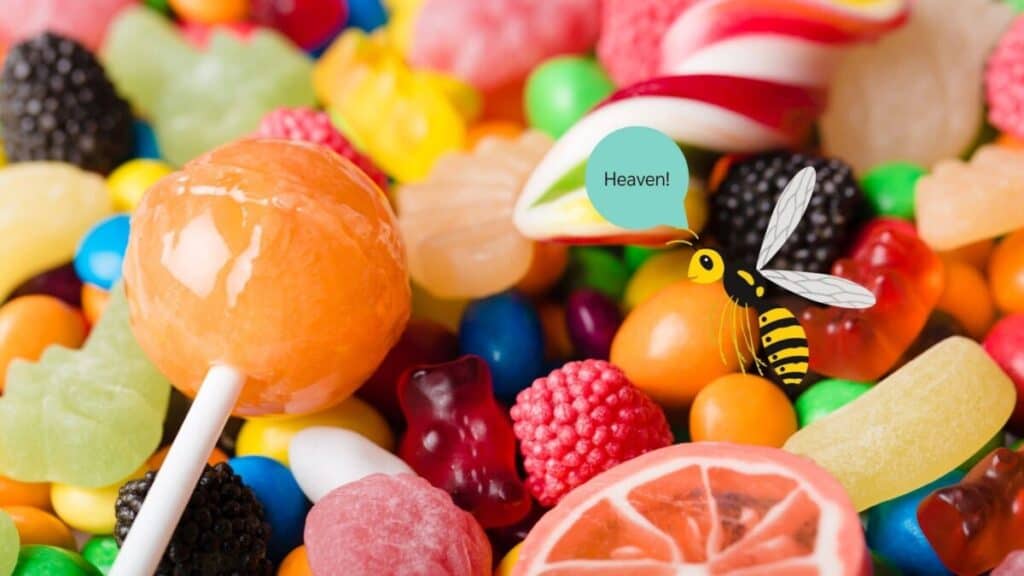
You may wish to keep a bowl or dish around if you are eating outside, so you can easily cover up food that you aren’t eating immediately.
Having a damp towel may help to reduce the risk of getting stung because you can wipe your hands and face and remove all traces of food.
Remember not to flap if a wasp does start flying around you or your food. This is likely to frighten the wasp, which is then much more likely to sting you.
Instead, calmly place the bowl or glass down and move away until the wasp flies off. You can then either consume the food/drink or discard it if you prefer.
Will Wasps Eat Your Food?
There is a high chance of wasps going after your food, yes, and that goes for all different kinds of foods – it isn’t just sweets, as some people believe.
It is true that in the fall, most wasps stop hunting grubs and insects, and instead start looking for sweet foods, but they eat other foods too.
They are more partial to ripe and rotting fruits in fall, but they’ll take what they can find.
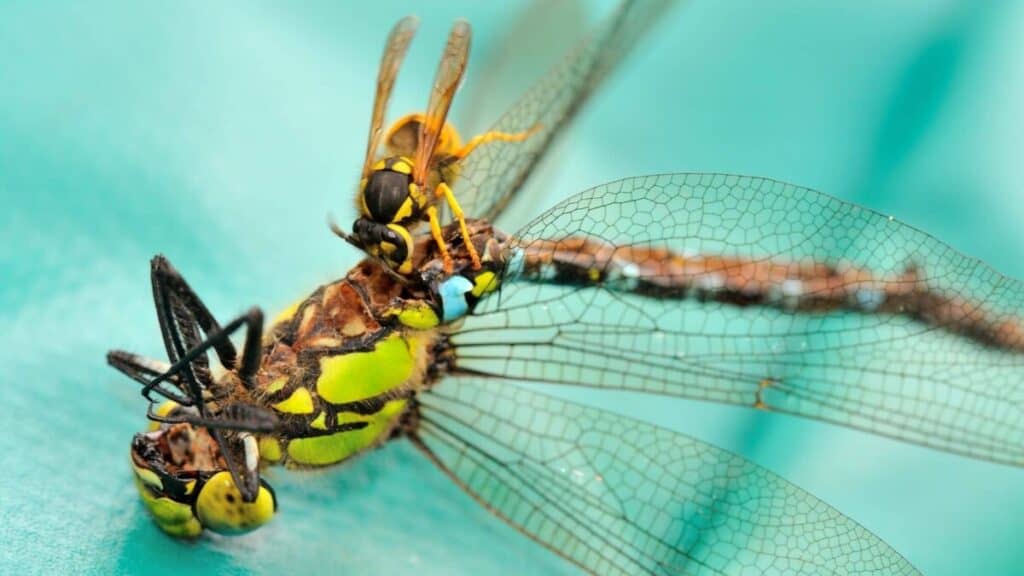
Almost any kind of food can attract wasps, regardless of the season. They do eat seasonally, but you may still find that they investigate and attempt to eat savory foods as well as sweet ones at any time of year.
It’s important to be aware of this if you are eating outside, perhaps at a picnic or something similar.
Because they are hunters, they will take meats and other protein-rich food. In the spring and summer, they’ll certainly choose proteins like ham and salami over sweet foods, as they are feeding grubs at this time.
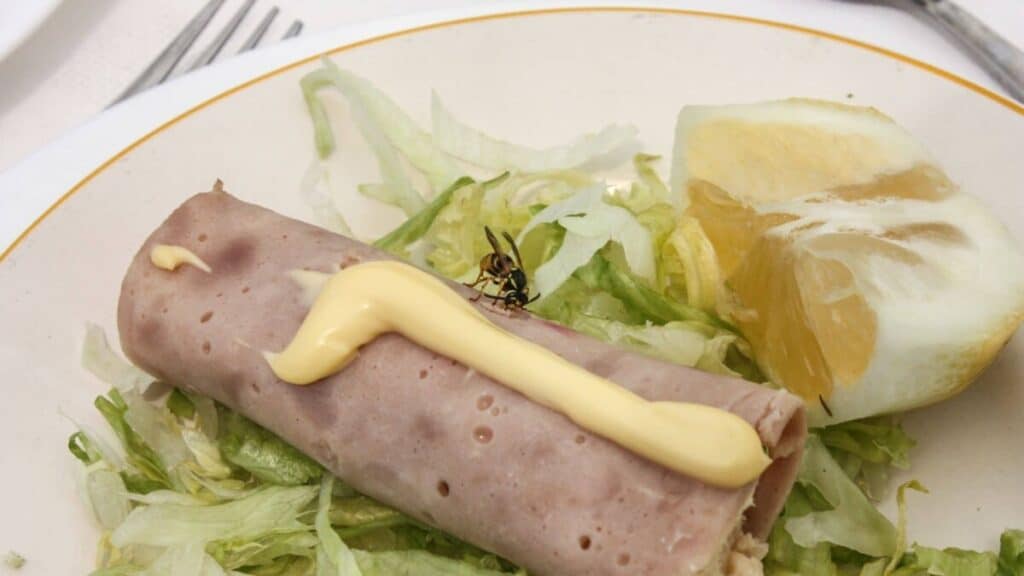
On the other hand, they are less likely to bother humans in the summer, as they tend to be busy hunting elsewhere, so you may not see them on these foods as often.
It’s worth being aware of the foods that they are keenest on in any given season, as this will allow you to cover up the things that they are most likely to eat.
If you are eating a picnic in the height of summer, consider covering cheese, meat, etc., and don’t worry as much about sweet foods.
Do You Get Multiple Wasps On Food?
You may have noticed that when one wasp gets on your food, other wasps follow with surprising speed and predictability.
Wasps that find food will often return to the hive and pass the message on to other wasps, so it’s quite likely that if one wasp finds your picnic, others will quickly turn up to take their share of the meal.
This is very frustrating if you are eating outside and you plan to stay for a while, as it can result in the party getting mobbed by wasps.
Even if nobody in the group is particularly afraid of them, having them crawl all over your food is highly off-putting.
If you see one wasp on your food, therefore, you should trap it temporarily under glass or another container so that it cannot fly away again.
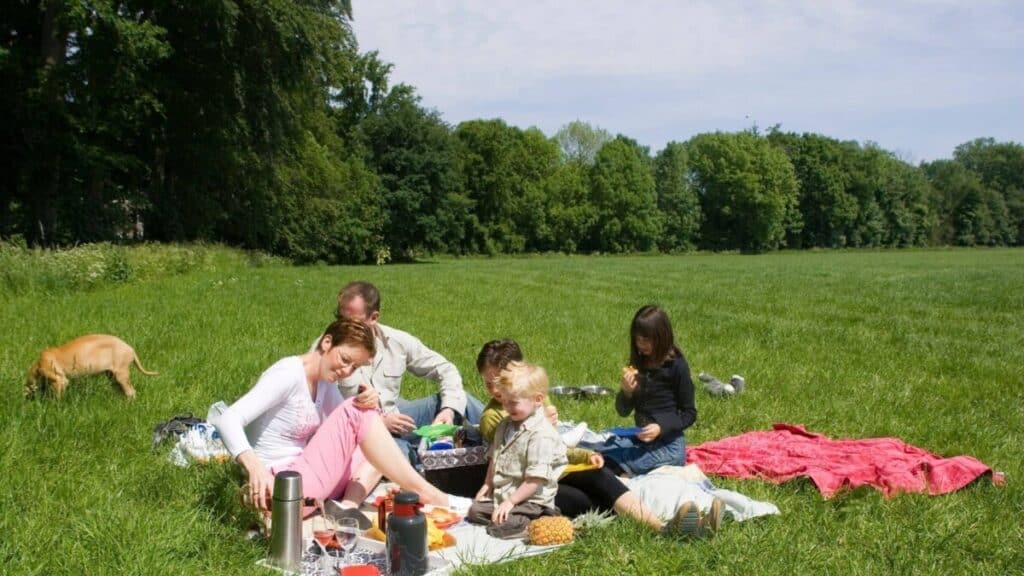
This will prevent it from fetching other wasps, and stop it from accessing your food while you are enjoying your picnic. Leave it there while you eat; as long as it is trapped, it won’t be able to sting you.
However, remember to release the wasp when you have finished eating and you’re ready to leave. Wasps are an important part of the ecosystem and they do a lot of cleanup work, so there’s no reason to kill a wasp when you are ready to leave.
Don’t hurt the wasp either, as it will attract others by releasing a distress chemical.
Conclusion
If wasps do get into your food, it is unlikely to hurt you if you eat it. Wasps do not usually carry germs or transfer diseases to your food, but if you want to be cautious, remove the part of the food that they have touched before you consume it.
Alright, that’s it for this article, here are a few hand-selected articles that you might also find interesting reads:
What Would Happen if I Swallowed a Wasp?Can you keep wasps as pets? Yes, Here’s How
7 of the Most Painful Insect Stings
Recent Posts
Tiny Black Bugs in Bathroom NO WINGS: What They Are and What to Do!
Finding tiny black bugs in your bathroom can be uncomfortable, to say the least. Especially if they are persistent, or they appear in very large numbers, which they often like to do. When it...
Tiny Black Bugs in Plant Soil - What Are They & What To Do About It
A short horror story: You get a new houseplant. You do your best to take care of it. You’ve ensured that it has the right soil, the right amount of sun, it gets enough water. And then one day, you...

